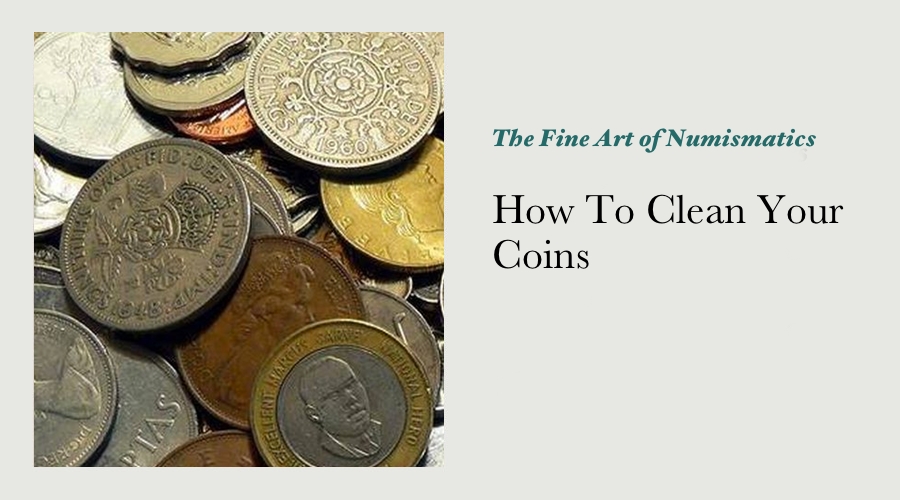How To Clean Your Coins

An immediate reaction that many people have when they find an old coin is to clean it, particularly if it's hard to make out what kind of coin it is.
That's understandable, it makes sense that if you clean a coin, it might help you find out if it is rare or not, and if cleaning it makes it look better, then surely that's got to make it more valuable.
Unfortunately, nothing could be further from the truth – 99.99% of the time, when a coin is cleaned, it becomes less appealing to collectors, and so becomes less valuable.
This concept can be pretty hard for the layman to understand – think of it this way. If a piece of find china is broken, then put back together with superglue, even though it'll look as good as new to the layman, it'll be of lesser interest to a collector, it's condition shows that it wasn't looked after as well as it might have been. Another example of that same fine china that is still in perfect condition will appeal much more to a collector – it's fragile beauty remains intact.
If a limited edition muscle car is involved in an accident, and the dents are repaired with a bit of “bog” and some spraypaint, it'll look as good as new to a novice, but will still look damaged to a collector.
It's a similar situation with coins – the reason collectors are prepared to shell out big money for a rare coin in top condition is because the appeal of the coin is enhanced when it looks the same as the day it was produced.
A £20 note that's over 80 years old, yet remains in close to perfect condition is a wonder to a collector. It had a huge purchasing power when it was issued yet obviously wasn't spent but set aside and kept untouched for close to a century. For that to happen, someone (often a few generations of the same family) has had to exercise great discipline and stop themselves from spending it. It's the discipline that appeals to collectors. Either that or the item was lost soon after it was issued, and languished somewhere until it was found by a stroke of incredible luck. So the high improbability of coming aross something like that appeals to collectors.
Now, when an item is cleaned, it generally shows that it has been mistreated for reasons of greed, naivety or both. The reason for that is because it's pretty much impossible to clean a coin without altering it from it's original state.
It is possible occasionally to improve a coin's appeal by treating it, but this can only be done in certain ways and in certain situations.
A someone that has tried every single outlandish way of cleaning coins as can be imagined, I can tell you that 99% of the time, cleaning a coin will not improve it's value.
What do the experts use to clean coins?
Here's a bit of a shopping list:
Warm soapy water; Window cleaner; Acetone; Bicarbonate soda; Cotton buds; Vinegar; Silver Dip; Lemon Juice; Furniture Polish.
Here's a list of things you shouldn't use to clean your coins:
Brasso; Coke; Steelwool; Concrete; Sandpaper; Toothpaste; German Mustard, etc etc.
So, the short answer is do not clean your coins, chances are pretty good you'll bugger them up.
One real story I know concerns two (adult) brothers that found a 1930 penny. They telephoned a dealer to get a valuation with a view to selling it, and the dealer concerned agreed to travel to their home to make an offer on it. When the dealer arrived, to look at the coin, the brothers pulled out what was indeed a genuine 1930 penny, bright and a little scratched up. The dealer was incredulous and asked what they'd done to it – one of the brothers rematrked that he'd wanted to “get the brown off it” and so he rubbed it on the concrete driveway. Unfortunately for the brothers, not only did they take the brown off the coin, they pretty much obliterated the designs, making it worthless. What was worth the equivalent of $25,000 today was rendered pretty much worthless in the space of a few short minutes.
Before you go ahead and boil your coins up in Coca Cola or some other home-grown remedy you've heard of, consider this story and how you'd feel if you did this to yourself!